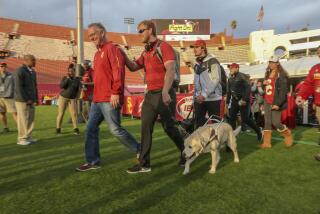Guide Dog Has Sights Set on a Frisky Person
- Share via
He walks with a determined stride. Ears cocked, head erect and leaning forward. He can turn left or right on command and knows when it’s safe to guide an unsighted person across a busy street.
But Yorbie’s quick step has slowed his chances to become a guide dog. The black Labrador is set to graduate from guide dog academy Friday and his trainers are scrambling to find a suitable partner for him.
He was supposed to be matched with a Yorba Linda man, but the chemistry just wasn’t there. So now he’ll stay with trainers at Guide Dogs of the Desert until a match can be made with a blind person who enjoys walking briskly.
“There’s a feeling you get in your gut, that this one’s the one,” said C.J. Daniel, director of admissions at the academy in Whitewater, a community near Palm Springs. “When that happens, you just go with it.”
Yorbie, sponsored for the program by the Yorba Linda Lions Club for $10,000, was to be paired up with Raymond Esquivel, who found the stout, 70-pound English Labrador a tad too frisky.
Esquivel went for a bigger “gentle giant” instead: Reuben, a 90-pound American black lab. Like Esquivel, Reuben was a little more laid-back.
Now, though, since Yorbie has been trained, trainers just need to find the right blind person to pair him with, a partner who shares the same enthusiasm for doing things.
“We all have different lifestyles,” said Katryn Webster, director of graduate services and an instructor for Guide Dogs of the Desert. “Yorbie has a quicker pace, like someone who would walk somewhere with determination--constantly.”
Guide dogs are not like pets. They are at the side of their visually impaired partners 24 hours a day, seven days a week. The dog and master have to trust one another and share an intuitive sense of what the other is thinking.
Dogs are picked as pups to live with residential trainers for a year. It’s there where the dogs are exposed to all sorts of conditions--from a walk in the mall to a long lecture at school.
Ramona Delzer, a Lions Club member living in Placentia, remembers teaching Yorbie the basics before he was admitted last year to the training school near Palm Springs.
“We had to get him acclimated to all sorts of environments so that he could learn to ignore distractions, like not jumping into the meat case at the grocery store,” she said.
Her daughter, Kimber, took him to class with her at El Dorado High School, where he sat still beside her. But when she took off his training blanket and he knew “work” was over, he wanted to be a puppy.
Once at the school, guide dogs go through a year of training with a harness. They learn to walk straight, turn left or right on command, and stay attuned to the safety of their partner.
Daniel said they also have to learn “intelligent disobedience”--a term used when the dog refuses to obey a command because it senses it would be too risky.
Pat Morrison, president of the Yorba Linda Lions Club, said she was happy Esquivel found a dog, even if it wasn’t Yorbie.
“We would have liked to keep Yorbie in Yorba Linda,” she said, “but we’re happy he’ll be matched with someone eventually.”
Guide Dogs of the Desert, which operates strictly from donations, trains about 40 dogs a year to be guides for the blind. The dogs, which cost about $20,000 to train, are given free to those who need them, said Don Robinson, executive director of the academy. People interested in applying should call (760) 329-6257.
Meantime, Guide Dogs of the Desert will keep Yorbie in the mix of labs, golden retrievers, poodles--and now boxers--awaiting partners. Webster is confident that somewhere out there is the perfect person for Yorbie.
“He’s a really sweet guy,” Webster said. “There’s an old wives’ tale that the larger the lump on top of their head, the brighter the dog. He has a pretty large lump up there.”





